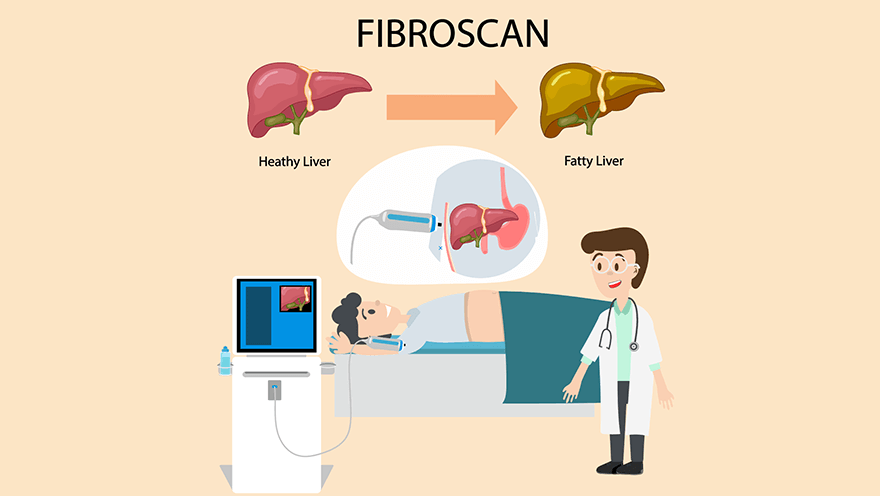
FibroScan is a noninvasive technique conducted by doctors to study the condition of the liver and identify diseases that could affect liver function. Carried out with ultrasound-based technology, this state-of-the-art diagnostic evaluation, also referred to as transient elastography, evaluates the volume of fat cells within a person’s liver (hepatic steatosis). The FibroScan procedure also helps specialists to assess the degree of stiffness in the liver tissue. A significant degree of stiffness can reveal the presence of fibrotic scar tissue, inflammation of the liver, or further concerns. When a fatty liver or fibrotic scarring is suspected, the skilled gastroenterologists at Digestive Health Associates of Texas in Dallas, TX may carry out a FibroScan analysis to diagnose and evaluate the severity of the disease.
Who needs a FibroScan test?
Gastroenterology specialists usually address diseases that affect the liver and may advise a FibroScan analysis for patients with indications of initial to advanced liver conditions. A gastrointestinal (GI) physician might recommend FibroScan tests for individuals who show one or more signs of a liver condition or injury, such as:
- Dysmetabolic syndrome
- Different degrees of hepatitis
- Nonalcoholic steatohepatitis (NASH)
- Severe liver fibrotic scarring (cirrhosis)
- Alcoholic liver disease
How FibroScan is performed
FibroScan is performed at Digestive Health Associates of Texas locations throughout Dallas, TX and might be advised as an alternative to a liver biopsy. It is normally carried out in combination with other types of medical imaging or blood tests to comprehensively check for a liver condition. Over the course of the procedure, individuals lie down on an exam table. The ultrasound technician then places the FibroScan ultrasound wand on the right upper abdomen, just underneath the ribcage. Several waves are applied directly into the liver, assessing the speed at which sound waves penetrate the liver. FibroScan tests are generally pain-free and typically require approximately 15 minutes or less to carry out.
How to interpret your FibroScan scores
Whenever FibroScan assessments are complete, the numbers are forwarded to the doctor who ordered the procedure. The test offers a numerical result that designates the measurement of fat cells inside the liver, also known as a controlled attenuation parameter (CAP) score, in addition to generating a fibrosis score.
-The FibroScan CAP score is measured in dB/m and helps ascertain the degree of fat cells within an individual’s liver. A greater CAP result points to a higher degree of fatty change and a more serious level of fatty liver.
-The fibrosis result offers evidence of the amount of fibrotic scarring (fibrosis) within the liver, extending from zero to mild or advanced (cirrhosis).
A follow-up visit with your GI specialist will be booked to assess and speak about the procedure outcomes. Suggestions for medical care or healthy behavior could then be provided as per the unique needs of the individual. Secondary FibroScan procedures could be performed on a periodic basis to monitor liver health or to establish whether disease to the liver has worsened.
Learn more about FibroScan tests in Dallas, TX
The liver is the second largest organ in the body and provides an essential function in maintaining comprehensive health. Hepatic steatosis as liver scarring could affect many aspects of an individual’s total well-being, from producing fatigue and abdominal bloating to heightening the risk of liver cancer and liver failure. The gastroenterology team at Digestive Health Associates of Texas in Dallas, TX performs noninvasive transient elastography procedures to discern the existence of fat in the liver or liver fibrosis. To get more information about FibroScan testing or to arrange a visit with a skilled gastroenterologist, please contact Digestive Health Associates of Texas today and speak with a team member.

